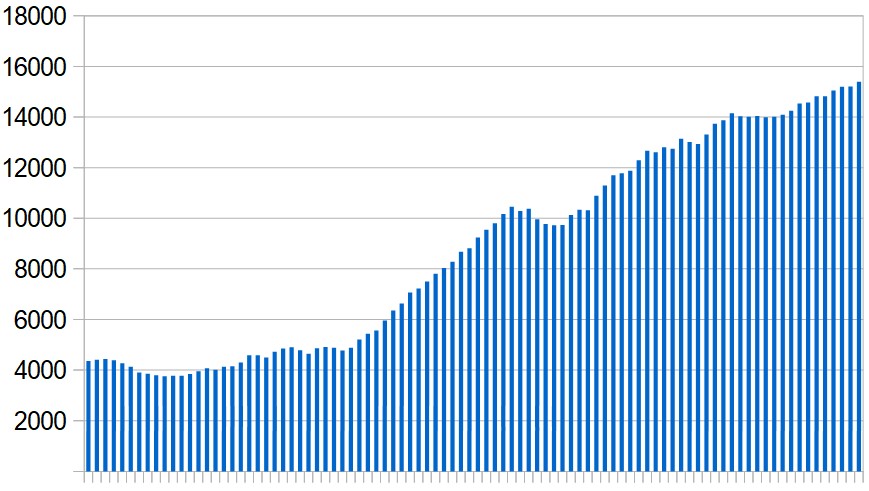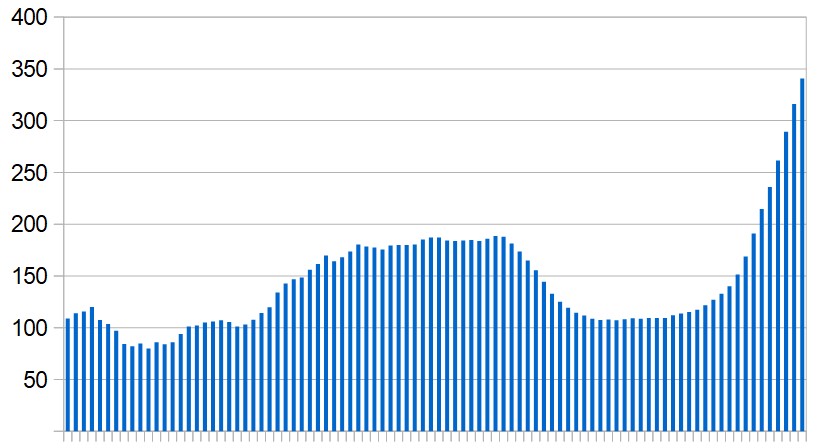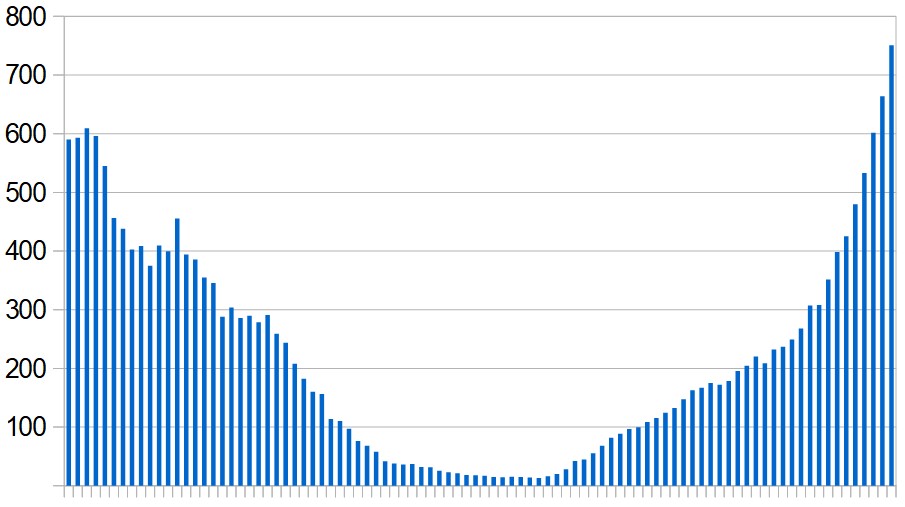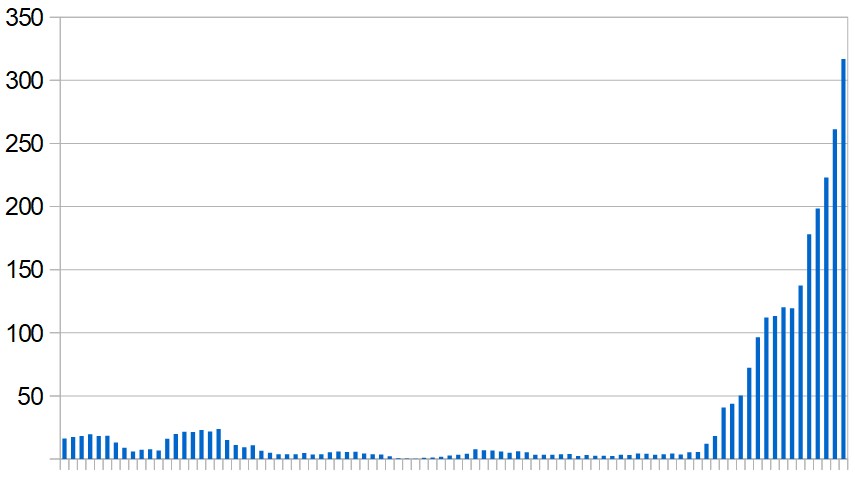Situation report: week ending 4 July 2020
REGIONAL OVERVIEW
 |
In most countries of the Middle East and North Africa the initial wave of Covid-19 infections has passed its peak but so far only Jordan and Tunisia appear to have brought it under control. Most countries managed to reduce new infections through lockdowns and other measures but in many of them the reduction hasn't continued and some have since seen big increases.
In 10 of the 20 countries monitored, new cases this week have been running at a higher level than in the previous week. The most dramatic examples are Israel and the West Bank of Palestine but Algeria and Iraq have also reported substantial rises.
Some of the increases can be attributed to easing of restrictions but there are repeated complaints from many part of the region that efforts to control the virus are hampered by non-compliance from the public, either by failing to observe precautions – holding social gatherings, not wearing face masks, etc – or by flouting the rules for quarantine and self-isolation. The countries least equipped to cope with the epidemic are Yemen, Sudan, Iraq and Libya.
Among countries reporting a decrease in new cases the reductions are mostly small, though Qatar's average of 838 new cases a day during the past week is more than 200 a day below the previous week's average.
The EU council has recommended that travellers from three Arab countries – Algeria, Morocco and Tunisia – can be allowed to enter the EU. The three are among a list of 15 countries worldwide which are considered epidemiologically "safe". It's unclear how the list was compiled and the inclusion of Algeria seems odd, especially when Jordan – which has been successful of the Arab countries in controlling the virus – is excluded. The list is not legally binding, so EU member countries are not obliged to follow it. Germany has already said it will not accept travellers from Algeria and Morocco.
Detailed statistics for the region, based on official figures, can be found in this spreadsheet.
Previous situation reports: June 27; June 20.
ALGERIA
 |
Algeria has recorded a relatively low number of cases – 344 per million inhabitants – but testing capacity is also low. New infections began increasing in mid-June as lockdown restrictions were eased, and this has accelerated during the past week, with record numbers reported. New cases averaged 341 a day during the past week, compared with an average of 169 the previous week.
President Abdelmadjid Tebboune said on June 28 that land, air and sea borders remain closed "until the end" of the Covid-19 crisis.
For more details see: Covid-19 in Algeria
Confirmed cases: 15,070
New cases in past week: 2,385
Active cases: 3,301
Deaths: 937
Tests carried out: (unknown)
BAHRAIN
The level of new infections in Bahrain fluctuates but the past week has seen a modest improvement. New cases averaged 515 a day compared with 556 during the previous week. Migrant workers who often live in overcrowded conditions account for the majority of cases in Bahrain.
For more details see: Covid-19 in Bahrain
Confirmed cases: 28,410
New cases in past week: 3,605
Active cases: 4,997
Deaths: 95
Tests carried out: 584,000
EGYPT
Egypt's strategy is to minimise economic damage by "coexisting" with the virus until a vaccine comes along. The official figures suggest new infections have reached a plateau, with an average of 1,422 a day during the past week – slightly below the previous week's average.
Egypt's airports reopened for international flights on Wednesday after a break of almost three months and the railways resumed full service.
However, health services are under strain, with medical staff complaining of inadequate protection, and the death rate remains high. Relations between the Sisi regime and the medical profession continue at a low ebb (see previous report). More than 100 health workers have died from Covid-19 and almost a thousand have been infected, according to the doctors' syndicate. Several doctors have been imprisoned or arrested after making comments on social media criticising the regime's handling of the situation.
For more details see: Covid-19 in Egypt
Confirmed cases: 72,711
New cases in past week: 9,956
Active cases: 49,820
Deaths: 3,201
Tests carried out: 135,000
IRAN
Iran was the first country in the region to be seriously affected by the virus and has since been hit by a second wave. Government figures show an initial wave of infections which peaked at the end of March. It subsided during April, briefly dipping below 1,000 new cases per day but then rose to a new peak in the first week of June.
New cases have dropped back a bit since then and the numbers have been relatively stable over the past two weeks – around 2,500 cases a day. There's a good deal of scepticism about Iran's official statistics, and it's widely assumed that they understate the scale of the problem.
Confirmed cases: 235,429
New cases in past week: 17,705
Active cases: 27,723
Deaths: 11,260
Tests carried out: 1.7 million
IRAQ
Iraq has seen steep rises since early June. New infections have been averaging more than 2,000 a day this week – the highest level since the outbreak began – and Iraq's official figures are widely believed to understate the scale of the epidemic. Many cases go unreported because of social stigma. Compliance with preventive measures appears to be low and health services are inadequate.
A report last week said Iraqi hospitals are spreading infection rather than helping to contain it, while test results arrive too late to be useful and are often unreliable (details here).
The World Health Organisation has issued some detailed statistics on Covid-19 in Iraq.
For more details see: Covid-19 in Iraq
Confirmed cases: 56,020
New cases in past week: 14,827
Active cases: 24,158
Deaths: 2,262
Tests carried out: 579,000
ISRAEL
 |
The situation in Israel looks very alarming: gains made during the lockdown have been wiped out by a second wave of infections. The initial wave peaked at around 600 new cases a day in early April and by the second half of May they had dropped to 15-16 a day. However, they began increasing again when restrictions were lifted and the rise over the last few days has been especially steep. New cases have averaged 751 a day during the past week – more than during the April peak.
The government is reluctant to impose a second nationwide lockdown but may eventually be forced to do so in order to avoid overwhelming health services. Currently, it is trying to focus on declaring "restricted zones" in particular hotspots. On Friday it went a step further, limiting attendance at event halls, bars, clubs and prayer houses to 50 people. Any other gatherings in closed spaces are now limited to 20 people.
Analysis of health ministry data by an Israeli website suggests buses and supermarkets are the most common sources of infection.
Israel's education ministry has been developing "flexible" plans for the next school year based on three alternative coronavirus scenarios (details here).
For more details see: Covid-19 in Israel
Confirmed cases: 28,055
New cases in past week: 5,255
Active cases: 10,060
Deaths: 326
Tests carried out: 1 million
JORDAN
Jordan has been one of the most successful Arab countries in controlling the virus, and the government has now reduced the official risk level from "medium" to "low". A few new cases are still being recorded but almost all of them are among people who were quarantined after arriving from other countries.
For more details see: Covid-19 in Jordan
Confirmed cases: 1,147
New cases in past week: 43
Active cases: 240
Deaths: 10
Tests carried out: 408,000
KUWAIT
Kuwait appears to be over the worst. New infections peaked around May 25 and then dropped back substantially, though there has since been a modest rise. The level of new cases is currently stable, averaging 710 a day during the past week.
Migrant workers who often live in overcrowded conditions account for the majority of confirmed cases and many have now returned to their country of origin.
For more details see: Covid-19 in Kuwait
Confirmed cases: 48,672
New cases in past week: 4,969
Active cases: 9,036
Deaths: 360
Tests carried out: 399,000
LEBANON
In the midst of political and economic chaos Lebanon is fortunate in having a relatively small number of recorded cases so far. Many of the recent infections have been detected among people returning from abroad. On Tuesday the government extended its "general mobilisation" against the virus until August 2.
Beirut airport reopened on Wednesday but with only a small number of flights, mainly for travel between Lebanon and the Gulf. The government has said passengers will not be quarantined on arrival because they are "expected" to have been tested for the virus before departure.
For more details see: Covid-19 in Lebanon
Confirmed cases: 1,830
New cases in past week: 133
Active cases: 503
Deaths: 35
Tests carried out: 141,000
LIBYA
Libya is in its ninth year of internal conflict. The UN-backed Government of National Unity in Tripoli is challenged by Field Marshall Haftar's forces based in the east of the country. There are also numerous militias.
This leaves the country ill-equipped to cope with a major epidemic. Growing levels of insecurity, political fragmentation and weak governance have led to a deterioration of basic services, particularly in the health system. At least 27 health facilities have been damaged or closed by fighting and some have been attacked directly. The number of confirmed infections is still small but testing is very limited. There are 870,000 people – refugees, asylum seekers and displaced persons – who the UN regards as especially vulnerable.
For more details see: Covid-19 in Libya
Confirmed cases: 918
New cases in past week: 205
Active cases: 661
Deaths: 27
Tests carried out: 29,000
MOROCCO
Morocco seemed to be making good progress until recently. A strict lockdown had kept the number of known Covid-19 cases below 10,000 and by early June new infections had fallen to around 40 a day. However, there was a major setback towards the end of June with the discovery of hundreds of new cases in the Kenitra area, most notably among women from rural villages employed to pack strawberries (see report). Since then, new infections have not dropped back to previous levels. During the past week new cases have averaged 236 a day.
Following the disruption of air travel by the pandemic, Royal Air Maroc is reportedly preparing a recovery plan which involves dispensing with 20 aircraft (about a third of its fleet) and reducing its workforce by 30%.
For more details see: Covid-19 in Morocco
Confirmed cases: 13,288
New cases in past week: 1,665
Active cases: 3,998
Deaths: 230
Tests carried out: 728,000
OMAN
Oman's outbreak grew slowly until the end of May but new cases have risen substantially since then. The health ministry says this has "nothing to do with" the reopening of activities. A ministry official blamed "continued indifference" by the public, saying that "most of the infections among citizens could have been easily avoided".
As in the other Gulf states, migrant workers in Oman have been disproportionately affected by the virus and almost 40,000 have left the country since March.
For more details see: Covid-19 in Oman
Confirmed cases: 43,929
New cases in past week: 7,895
Active cases: 17,557
Deaths: 193
Tests carried out: 203,000
PALESTINE
 |
Until the fourth week of June Palestine's outbreak was still small, with fewer than 1,000 known cases. Since then, though, the number has more quadrupled, with the Hebron area of the West Bank particularly affected (see report). On Friday the authorities imposed a "total lockdown" of the West Bank which is due to last five days but could be extended. Palestinians are being told to stay at home and businesses will be closed except for the sale of food and medicines.
Many of the recent infections are attributed to people ignoring the rules for social distancing, which the authorities have difficulty enforcing. The health ministry says more than 30% of cases are the result of Palestinians travelling to and from work in Israel where new cases are also increasing.
Fears of a major epidemic in Gaza have not materialised. Most of the known cases there are apparently due to contacts with Egypt.
For more details see: Covid-19 in Palestine
Confirmed cases: 4,013 (West Bank 3,526, Gaza 72, East Jerusalem 415)
New cases in past week: 2,218
Active cases: 3,124
Deaths: 15
Tests carried out: 85,000
QATAR
In population terms Qatar has more known cases than any other country – 30,000 per million inhabitants. Migrant workers have been disproportionately affected. Qatar's epidemic reached a peak in the first week of June and new cases have fallen steadily since then. During the past week new cases averaged 838 a day, compared with more than 1,800 a day at the peak. The government has embarked on a four-stage plan for lifting restrictions.
For more details see: Covid-19 in Qatar
Confirmed cases: 98,653
New cases in past week: 5,869
Active cases: 9,949
Deaths: 121
Tests carried out: 372,000
SAUDI ARABIA
Saudi Arabia has the largest number of recorded cases among the Arab countries. New infections reached an initial peak in the fourth week of May, then dropped back slightly before rising to a higher peak in the third week of June. The current seven-day average of new cases is 3,889 – about 500 a day below the June peak.
Migrant workers have been disproportionately affected but the authorities have also complained about non-compliance with precautionary measures by Saudi citizens.
This year's Hajj (the annual pilgrimage to Mecca) which is due to start on July 28 and normally attracts millions of Muslims from around the world will be restricted to people living in the kingdom – and may also be limited to around 1,000 participants who will be quarantined both before and after the event.
For more details see: Covid-19 in Saudi Arabia
Confirmed cases: 201,801
New cases in past week: 27,224
Active cases: 59,385
Deaths: 1,820
Tests carried out: 1.8 million
SUDAN
The coronavirus struck Sudan in the midst of a political transition following a popular uprising against the regime of President Bashir and the country is ill-equipped to cope with a major epidemic. Testing is very limited and official figures don't reflect the full scale of the outbreak. Most cases are said to be in and around the capital, Khartoum, but there's also concern about the Darfur area where large numbers of deaths are being reported, apparently caused by Covid-19.
In an update this week, the OCHA expressed concern about the future of health services for about 55,000 people – displaced people and residents – in Tawilla town, North Darfur. "The only health facility in the area providing in-patient services faces a lack of funding while confirmed cases of Covid-19 are on the rise in the state," it said.
The OCHA has previously reported on the deterioration in Sudan’s health care system which was already "under extreme stress" before the arrival of Covid-19. It said 81% of the population have no access to a functional health centre within two hours' walk from their home. Some existing facilities have been closed due to virus outbreaks or lack of medical staff.
For more details see: Covid-19 in Sudan
Confirmed cases: 9,663
New cases in past week: 406
Active cases: 4,435
Deaths: 604
Tests carried out: 401
SYRIA
Based on official figures (which some view with scepticism), Syria has very few confirmed cases. This may be because the Assad regime took preventive action before any infections had been officially recorded.
Over the last two weeks new cases have averaged nine a day, according to health ministry figures. In joint report this week the UN and WHO said: "It remains a priority to enhance laboratory and case investigation capacity across Syria, including laboratory technicians and rapid response teams training."
Fears have been raised about north-western and north-eastern parts of the country which are outside the regime's control. Millions of displaced people are living in those areas and health services are often rudimentary. So far, only a handful of cases have been diagnosed in the north-east and none in the north-west.
For more details see: Covid-19 in Syria
Confirmed cases: 328
New cases in past week: 73
Active cases: 195
Deaths: 10
Tests carried out: (unknown)
TUNISIA
There is currently little or no transmission of the virus inside Tunisia. The daily average of new cases has been in single figures since early May.
On June 27 Tunisia reopened its land, sea and air borders after a closure of more than three months. It is seeking to revive the economically important tourism industry and has begun promoting the country as a "safe" holiday destination. The health ministry is urging the public to continue with preventive measures such as wearing masks, social distancing and hand washing.
For more details see: Covid-19 in Tunisia
Confirmed cases: 1,181
New cases in past week: 17
Active cases: 86
Deaths: 50
Tests carried out: 71,000
UNITED ARAB EMIRATES
The UAE's epidemic peaked in the last week of May when new cases were running at more than 900 a day. Numbers have fallen steadily since then but are no longer decreasing. During the last 10 days they have hovered around 400 a day. Migrant workers have been disproportionately affected in the UAE.
For more details see: Covid-19 in the UAE
Confirmed cases: 50,141
New cases in past week: 3,168
Active cases: 10,670
Deaths: 318
Tests carried out: 3.5 million
YEMEN
Because of the ongoing war, Yemen already faced a humanitarian crisis before the coronavirus arrived. Millions are malnourished and vulnerable to disease, and health services are inadequate. Official figures do not reflect the severity of the epidemic. Unusually large numbers of deaths are reported, many of them from symptoms resembling Covid-19 and hospitals often refuse treatment if coronavirus is suspected. The Houthis, who control the capital, Sanaa, and much of the north, have a policy of not reporting cases so as to avoid lowering morale and distracting from their war effort.
For more details see: Covid-19 in Yemen
Confirmed cases: 1,244
New cases in past week: 151
Active cases: 369
Deaths: 336
Tests carried out: 120

 RSS Feed
RSS Feed
